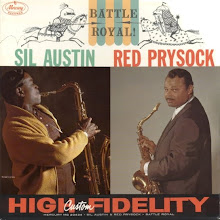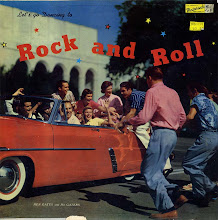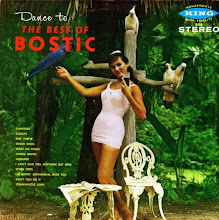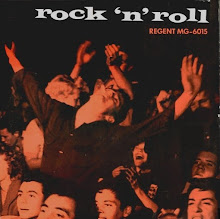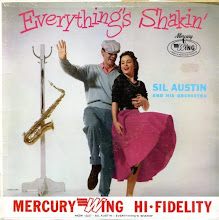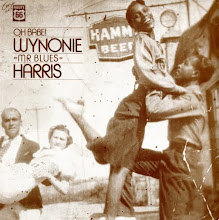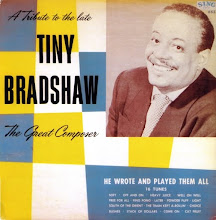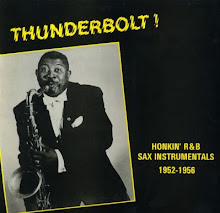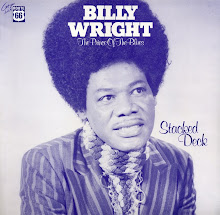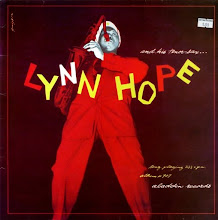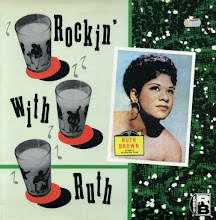Side 1
1. Back Street
2. Last Call
3. Song Of India
4. Dureop pt 1
5. Dureop pt 2
6. Cradle Rock
7. Lazy Mood
8. Blue Steel
9. All Out
Side 2
1. Wooden Soldiers Swing
2. 6 String Boogie
3. Walkin' Home
4. Lonesome Road
5. Come On In
6. La! La! La! Lady
7. Goin' Long
8. Back Up
“Rockin’ rhythm is what Eddie (Long Gone) Chamblee and his combo call it … It combines blues, bop and swing in a manner fit for the most severe critic of present day music. A favourite on the juke box, Eddie has hit the top with his sax solos on “Long Gone” and “Late Freight” (quoted from The Chicago Defender on The Red Saunders Research Foundation Website.)
I guess the above quote neatly sums up my favourite kind of music – the sax led R&B or jazz of the 1940s and early 1950s when the boundary between the two kinds of music wasn’t as rigid as it would become as the ‘50s wore on. Eddie Chamblee was one of many musicians who were comfortable in both spheres. He played on some of the biggest R&B hits of the day and also played tenor sax in the Lionel Hampton big band in the mid 1950s.
He was born in Atlanta, Georgia, in 1920 but grew up in Chicago. Although he had been playing tenor saxophone since the age of twelve, he really learned his chops while playing in Army bands during his war service from 1941 to 1946.
On his return to Chicago, Eddie started gigging around local clubs such as The Blue Heaven Lounge and was soon involved in sessions for a new label, Miracle, for whom he would record until 1950. In June 1946 he was in the Dick Davis Sextette session at which “Tenor-mental Moods” was recorded – an instrumental which boasted a triple tenor sax line up of Davis, Chamblee and Tommy “Madman” Jones.
In October 1947 Eddie was back at Miracle, this time recording a session under his own name, backed by a basic guitar, piano and bass trio. “Last Call,” a competent enough instrumental, dates from this session. The other side of the disc (Miracle 119) was “Certain Other Someone” a vocal performance featuring Browley Guy.
A month later Eddie joined
Sonny Thompson and The Sharps and Flats to record the side which was to be his most successful – “Long Gone, Part 2.” Before the end of 1947 Eddie featured on more Sonny Thompson sides as Miracle stockpiled recordings in the face of the looming AFM recording ban. Among those sides was
“Late Freight” which like “Long Gone” would be another huge hit in 1948.
 |
| Scan courtesy of El Enmascarado |
Eddie’s second session for Miracle under his own name took place in July 1948. This time he was backed by a larger band which included baritone sax player Andrew “Goon” Gardiner who features prominently on the rollicking “Back Street.” The fiery version of “Song of India” also dates from the same session as do the two part jam session “Dureop” and the easy going “Cradle Rock.” The nice and bluesy “Lazy Mood” was recorded a month later at the tail end of a St. Louis Jimmy Oden session.
In 1949 Eddie was a big name thanks to his work on the Sonny Thompson hits “Long Gone” and “Late Freight.” Eddie was featured on another Sonny Thompson session in April 1949, laying down solos on “Still Gone, Part 3,” and “The Fish” aka “Jam, Sonny, Jam.”
1950 was the year that Miracle went bust. On January 25th, Eddie Chamblee was the leader at the second last recording session held by the doomed label, laying down “Blue Steel” and “All Out,” the latter featuring good interplay between Eddie and baritone sax player Charles Stewart.
In May 1950, Lee Egalnick, the founder of the failed Miracle label started a new label, Premium. In July 1950, Eddie recorded four sides for the label, with two being released on Premium 856 – “Sweet Lucy” and “Every Shut Eye Ain’t Sleep,” the latter featuring Danny Overbea on vocal. In early 1951 Eddie cut another couple of sides for Premium – “Laughing Boogie” and “This Is It.”
In the summer of 1951 Premium went the way of Miracle. One of the honchos at the latest failed label, Lew Simpkins (he had also been with Miracle) quickly helped to found a new Chicago diskery – United – which signed up several former Miracle and Premium acts, including Eddie Chamblee.
The next session under Eddie’s name was in 1952 for Coral. Two excellent tracks from the session are on this LP – “Wooden Soldiers Swing” and “6 String Boogie” with the latter track being a showcase for some great guitar work by “Sir” Walter Scott. In the meantime Eddie was backing jive group The Four Blazes on United at several sessions between January 1952 and August 1953. Eddie was on the group’s biggest hit, “Mary Jo” which was recorded in January 1952 and reached number one in the R&B charts in August 1952.
United had a particularly strong roster of R&B leaning jazz artists, or should that be jazz leaning R&B artists? Eddie Chamblee, Tab Smith, Jimmy Forrest, Paul Bascomb, Cozy Eggleston, Jimmy Coe, Leo Parker, Gene Ammons and Tiny Grimes all recorded for United (or its States subsidiary) at one time or another. The label’s policy of aiming jazz oriented releases at the R&B market provided it with two massive hits – “Because of You” by former Lucky Millinder alto sax man Tab Smith and “Night Train” by Jimmy Forrest who adapted a riff he picked up while with Duke Ellington to fashion one of the all time great tenor sax instrumental numbers.
 |
| Tab Smith - "Because of You" |
 |
| Jimmy Forrest - "Night Train" |
Unfortunately there was to be no such success for Eddie Chamblee. His first recordings for United as the named artist came at the end of a Four Blazes session on August 17th, 1953. “Walkin’ Home” and “Lonesome Road” were released as United 160, with Eddie billed as “The Rockin’ and Walkin’ Rhythm of Eddie Chamblee.” Both are good performances with “Walkin’ Home” being a growler very much in the vein of “Long Gone” and “Lonesome Road” being a fine slow ballad.
Eddie’s next and last recordings for United came at the end of a session backing the Five C’s on July 30th 1954. “Come On In” and “La! La! La! Lady” were released as United 181. Both feature vocal performances by Eddie. “Come On In” is a good swinger with tasty guitar fills by Leo Blevins as well as the expected driving sax work from Eddie. “La! La! La! Lady” is another great combo performance - a sly, hip shuffler with Eddie in particularly good vocal form.
In 1955 Eddie did some band leading work for a new label, Club 51, and some session work for Chess. He then toured and recorded with the Lionel Hampton big band into 1956. The tour took the band to France, where a concert at The Paris Olympia was recorded, which you can find
here.
In 1957 Eddie was back in Chicago and married to his former school friend Ruth Jones, better known as Dinah Washington, the queen of R&B. He joined his wife on the Mercury label, recording a session under his own name in New York on March 7th, 1957. “Goin’ Long” b/w “Back Up” was released as Mercury 71107. “Goin’ Long” was another “Long Gone” retread while “Back Up” was a more up-tempo swingin’ jazz instro.
In early October Eddie was busy at Mercury – backing Dinah Washington in a studio orchestra credited as the Ernie Wilkins Orchestra on October 1st and 2nd and on the 4th of October with a similar group of musicians billed as the Eddie Chamblee orchestra. The following day he recorded tracks for an LP with a small group of musicians from the big band, billed as the Eddie Chamblee Septet. The album appeared on EmArcy as “Chamblee Music.”
Eddie continued to back Dinah on Mercury on several more sessions in late 1957 and recorded two tracks under his own name, “One for Dinah” and “Body and Soul,” which remained unreleased. In January 1958 Eddie was back in the studio, recording tracks with his septet which would appear on the EmArcy LP “Doodlin’” and also backing Dinah. Her presence at the sessions allowed “Doodlin’” to be billed as by “Eddie Chamblee and Friend” with Dinah featuring on the front cover photo and also on the back cover.
 |
| Scans from anonymous donor - restored by "Brian with a B" |
The marriage lasted two years and Dinah’s subsequent sessions for Mercury were without Eddie, and he moved to New York where he based himself for the rest of his life. In 1964 he recorded an LP with an organ combo for Prestige, “Rockin’ Tenor Sax,” but his next and last recordings as session leader were not until 1976 when he recorded the album “Twenty Years After” for the French Black and Blue label with Arnett Cobb, Milt Buckner and Panama Francis. He continued to make live appearances with a jazz combo in New York in the 1980s, eventually dying in a nursing home in the city in 1999.
Ripped from vinyl at 320 kbps.
Download from here:
http://www18.zippyshare.com/v/ISfxYctJ/file.html
1. Back Street
2. Last Call
3. Song Of India
4. Dureop pt 1
5. Dureop pt 2
6. Cradle Rock
7. Lazy Mood
8. Blue Steel
9. All Out
10. Wooden Soldiers Swing
11. 6 String Boogie
12. Walkin' Home
13. Lonesome Road
14. Come On In
15. La! La! La! Lady
16. Goin' Long
17. Back Up
Mo’ Eddie to buy:
Honkers and Bar Walkers Volume Three (Delmark DE-542) has ten tracks recorded for United by Eddie -the four that were released, plus some unreleased tracks and a couple of Four Blazes tracks. Also on the CD – T.J. Fowler, Floyd Taylor, J.T. Brown, Sax Mallard, Wild Bill Moore, Swinging Sax Kari, and Jim Conley.
The other two volumes in this series are highly recommended and a visit to the Delmark website is a must for those of you who like your R&B jazzy or your jazz with an R&B sensibility. They’ve got CDs by Tab Smith, Jimmy Forrest and J.T Brown. Well worth a look.
The Four Blazes – Mary Jo (Delmark DE-704) has lots of slinky sax fills by Eddie Chamblee, all in fantastic sound quality.
For those who like to dig deep:
Eddie Chamblee – The Complete Recordings 1947-1952 (Blue Moon)
Eddie Chamblee, Julian Dash, Joe Thomas – The Complete Recordings (Blue Moon) has Eddie’s sides from 1953-54.
Sources: The Red Saunders Research Foundation website; The Jazz Discography website; sleevenotes from “The Rockin’ and Walkin’ rhythm of Eddie Chamblee” – Dave Penny; The Bruyninckx Discography; sleevenotes from “Honkers and Bar Walkers, Volume Three” – Bob Porter; sleevenotes from “Mary Jo – The Four Blazes” – Peter Grendysa.


















































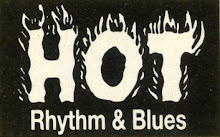
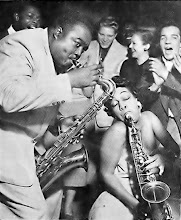






.jpg)
%2045%20-%20508A.png)
















